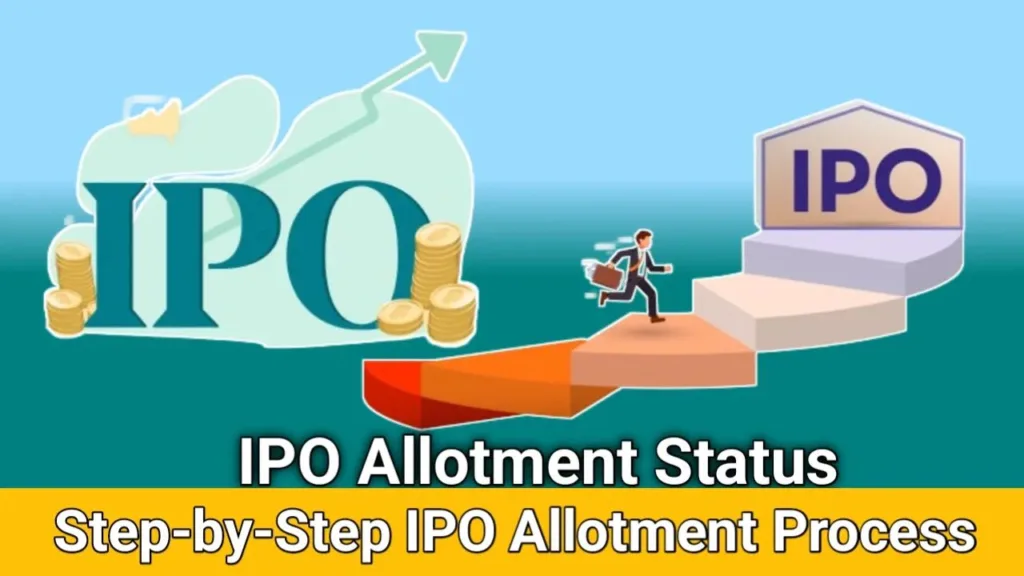
Checking your IPO allotment status isn’t just about seeing a “yes” or “no.” Behind that result is a detailed, regulated process that ensures fair and transparent share distribution. If you’ve applied for an IPO and want to understand how shares are actually allotted, here’s everything you need to know.
Step-by-Step IPO Allotment Process
1. Application Collection & Validation
Once the IPO bidding closes, all applications—whether online via ASBA/UPI or offline—are collected by the Registrar. Every application is carefully verified:
- Valid PAN and Demat account details.
- Only one application per PAN.
- Sufficient funds in the ASBA account.
- Correct price bid (for book-built IPOs).
- Matching signatures (for offline applications).
⚠️ Applications that fail these checks are rejected and funds are unblocked.
2. Segregation by Investor Category
Valid applications are sorted into SEBI-defined investor categories, each with its reserved share percentage:
- Retail Individual Investors (RIIs):
Apply up to ₹2 lakh. Usually 35% of the issue is reserved. - Non-Institutional Investors (NIIs):
Apply over ₹2 lakh. 15% reserved. Further split into:- Small NIIs (₹2–10 lakh): Get 1/3rd of the NII quota.
- Big NIIs (Above ₹10 lakh): Get 2/3rd of the NII quota.
- Qualified Institutional Buyers (QIBs):
Includes mutual funds, banks, FPIs. Typically get up to 50% (or minimum 75% for loss-making companies). - Anchor Investors:
Apply one day before IPO opens. Up to 60% of the QIB quota can be reserved here. - Employee & Shareholder Quotas:
Optional, but available in select IPOs. - Also Read:- From Rejection to ₹500 Crore: The Unstoppable Journey of Vineeta Singh and Sugar Cosmetics
3. Allotment Rules: Undersubscription vs Oversubscription
🔻 Undersubscribed IPO:
If fewer shares are applied for than available, everyone gets what they applied for.
🔺 Oversubscribed IPO (most common):
This is where things get tricky:
- Retail Investors:
A lottery system is used to ensure fairness. If you win the lottery, you get at least one lot (even if you applied for more). Heavily oversubscribed IPOs may result in no shares for many. - NIIs and QIBs:
Proportional allotment is followed. If the oversubscription ratio is 2:1 and you applied for 1,000 shares, you’ll receive 500 shares.
4. Basis of Allotment (BoA) Finalization
The Registrar, along with stock exchanges, prepares the Basis of Allotment. It clearly states:
- How many shares each investor type received.
- Rules followed in lottery or proportional distribution.
- Allotment ratios and cut-offs.
This document ensures complete transparency in the allotment process.
5. IPO Allotment Status – How to Check
Once allotment is finalized, you’ll receive updates through:
- SMS and Email: Sent to registered mobile/email.
- Registrar’s Website: Enter PAN, application number, or Demat ID (e.g., KFintech, Link Intime).
- BSE/NSE Websites: Check allotment status with PAN or application number.
- Broker Platforms: Some brokers offer direct IPO allotment tracking in their apps or websites.
📌 Tip: Save your PAN and application number for faster checking.
What Happens After IPO Allotment?
After shares are allotted, the following actions take place:
1. Refunds & Fund Release
- If you didn’t receive shares (or got partial allotment), the blocked funds are automatically unblocked within 3–4 working days.
2. Credit of Shares
- If allotted, shares are credited to your Demat account within 4–5 working days.
3. Stock Exchange Listing
- According to SEBI’s new T+3 rule (Dec 2023), shares must list within 3 working days after issue closure.
4. Start of Trading
- On listing day, the stock enters a pre-open session to discover its opening price, followed by normal market trading.
Common Reasons for IPO Allotment Rejection
Even with a valid application, there’s no guarantee you’ll receive shares—especially in oversubscribed issues. Here are common reasons for rejection:
| ❌ Reason | 🧾 Details |
|---|---|
| Oversubscription | Shares allotted via lottery in retail category. No guarantee of allotment. |
| Duplicate Applications | Only one application per PAN is allowed. All multiple entries are rejected. |
| Incorrect Details | Mistakes in PAN, Demat number, or bank account info can lead to rejection. |
| Low Bid Price | If you bid below the final issue price in a book-built IPO, your bid is invalid. |
| Insufficient Funds | If ASBA/UPI didn’t block the required amount, the application is canceled. |
| Offline Signature Mismatch | Signature must match bank records. Otherwise, it’s rejected. |
| Technical Errors | Occasionally, system glitches may lead to unprocessed or invalid bids. |
Conclusion: Why Understanding IPO Allotment Matters
Knowing the IPO allotment process helps investors avoid errors, set realistic expectations, and stay informed about refunds, share credit timelines, and listing dates.
Key Takeaway: Submitting a valid application doesn’t guarantee shares—but following the right steps improves your chances.
Read more:-1. India’s Stock Market in 2025: A New Era of Investment Opportunities
2. Top 10 Profitable Low-Investment Business Ideas to Start Today